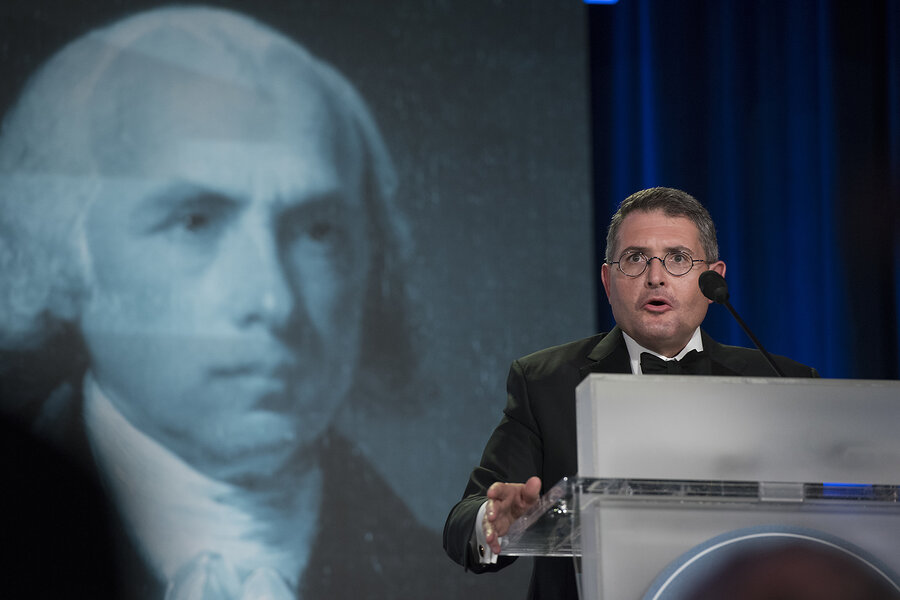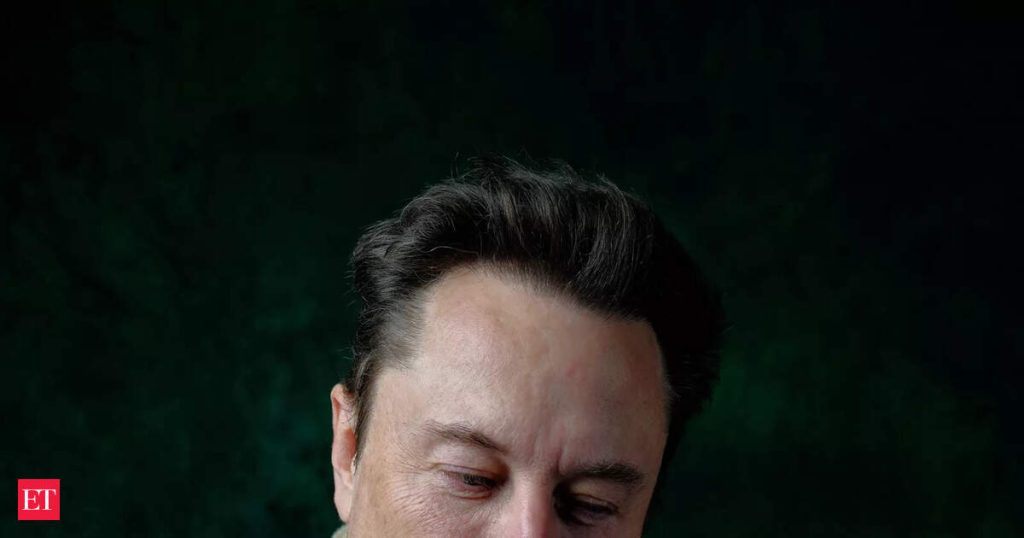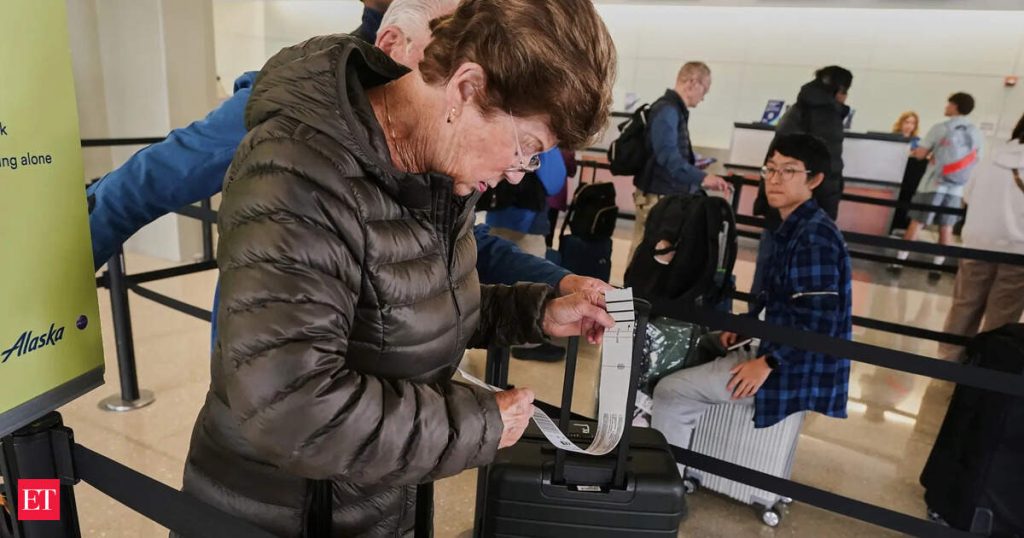Now Reading: A MAGA judiciary? Trump rift with Federalist Society signals a search for loyal judges.
-
01
A MAGA judiciary? Trump rift with Federalist Society signals a search for loyal judges.
A MAGA judiciary? Trump rift with Federalist Society signals a search for loyal judges.

Of all of President Donald Trump’s deals, none may be more consequential than the one he struck in 2016 with Leonard Leo. The Federalist Society, President Trump announced, would manage his judicial appointments.
Four years and 226 judges, including three U.S. Supreme Court justices, later, Mr. Trump made the federal judiciary much younger and much more conservative. But now, as the courts have continued to stall his policies, the president and some of his supporters are seeking another conservative judicial transformation.
In doing so, the president has widened a rift on the political right between Trump die-hards and those they denigrate as mainstream elites. The result is likely to be a ratcheting up of political rhetoric around the courts, a rhetoric that had already reached a new intensity in Mr. Trump’s second term.
Why We Wrote This
President Donald Trump previously relied on the conservative Federalist Society to help him remake the judicial branch. After recent setbacks in court, the president is signaling a new approach to vetting judicial nominees.
“Trump has signaled he’s not going to defer to the people he did in the first term because they picked people he didn’t like,” says Josh Blackman, a professor at the South Texas College of Law. “Where does that leave us? I don’t know.”
In a social media post last week, Mr. Trump laid into Mr. Leo – whom he described as a “sleazebag” and “a bad person” – and The Federalist Society, a conservative legal organization founded in 1982.
“I am so disappointed in The Federalist Society because of the bad advice they gave me on numerous Judicial Nominations,” he wrote. “I am very proud of many of our picks, but very disappointed in others. They always must do what’s right for the Country!”
For his part, Mr. Leo, co-chairman of The Federalist Society, responded cordially in a statement. “I’m very grateful for President Trump transforming the Federal Courts, and it was a privilege being involved,” he said. “There’s more work to be done, for sure, but the Federal Judiciary is better than it’s ever been.”
Mr. Trump now appears to favor a new kind of judicial nominee. His latest is Emil Bove: his former personal lawyer and, more recently, the face of Department of Justice efforts to combat a justice system Mr. Trump says has been weaponized against him.
On closer inspection, Mr. Bove’s nomination to the U.S. Court of Appeals for the 3rd Circuit may not be as radical as it appears. Presidents have nominated personal friends for judgeships in the past, as well as people with no experience on the bench. But the nomination has set alarm bells ringing on both sides of the aisle.
A different type of nominee
Like countless federal judges, Mr. Bove served as a federal prosecutor. Like countless others, he worked in both private practice and the Justice Department. But his private practice involved defending Mr. Trump himself from criminal prosecutions. In the months since Mr. Trump named him an acting top prosecutor in the DOJ, he has at times acted as if he is still the president’s personal lawyer.
In January, he directed the firing of more than a dozen prosecutors involved in cases related to Jan. 6, 2021, when hundreds of Trump supporters attacked the U.S. Capitol. In February, he abruptly ended a prosecution of New York City Mayor Eric Adams in a seemingly quid pro quo agreement with the Trump administration. Almost a dozen prosecutors resigned in protest.
It didn’t start this way.
Mr. Trump’s judicial nominees this term have experience working for conservative judges and prosecutors, and experience working in the regions they have been nominated for. They have “standard issue” credentials, says Carl Tobias, a professor at the University of Richmond School of Law.
“Bove is different,” he adds.
Indeed, everyone seems to agree that the Bove nomination is different. His supporters believe that Mr. Bove is the kind of different the federal judiciary needs.

Jeenah Moon/Bloomberg/AP/File
Emil Bove represents Donald Trump in a Manhattan criminal court during Mr. Trump’s sentencing in a hush money case in New York, Jan. 10, 2025. President Trump has now nominated Mr. Bove as a judge for the U.S. Court of Appeals for the 3rd Circuit.
This Trump term is about appointing judges “who will be more courageous,” says Will Chamberlain, senior counsel at The Article III Project, a conservative legal organization founded in 2019 that says it brings “brass knuckles to fight leftist lawfare.”
This desire for “courageous” judges appears to be a product of the Trump administration’s ongoing struggles in the courts. Federal judges have issued nearly 200 rulings pausing Trump policies, believing them to be unlawful. The U.S. Supreme Court – with six conservative justices, including three Trump appointees – has been an unreliable backstop.
These frustrations reached a boiling point last week. The day Mr. Trump officially announced the Bove nomination, the U.S. Court of International Trade ruled that the president’s order for sweeping international tariffs was unlawful. The decision prompted the president’s 500-word anti-Federalist Society post.
The Wall Street Journal editorial board responded the next day.
“In Mr. Trump’s universe the only good judge is one who always rules in his favor,” the board wrote. Because of his “attacks on judicial conservatives,” the board added, “Mr. Trump is likely to see fewer judges retire, lest they be replaced by partisan hacks.”
Other conservative critics of the Bove nomination, and of Mr. Trump’s recent rhetoric, include Ed Whelan, a legal commentator at National Review; and John Yoo, a high-profile lawyer in the George W. Bush administration.
Having described Mr. Bove as a “DOJ henchman” in one column, Mr. Whelan doubled down in a later piece.
“I have serious doubts that Bove has the character and integrity to be worthy of confirmation as a federal judge,” he wrote. “I hope very much that my doubts prove ill-founded.”
What is a ‘courageous’ judge?
At a time when threats to judges are rising, others believe judicial courage has been on display as judges have checked what they view as overreaches of presidential power.
“The way the Framers adopted [the Constitution] was to make the judiciary an independent branch of government,” says Professor Tobias. “The notion that a judge would base an opinion on loyalty to the president is anathema to that idea.”
For now, the Bove nomination is an outlier. Of Mr. Trump’s handful of judicial nominations so far, Mr. Bove is the only one with this level of partisan controversy. But the question now becomes whether the Bove nomination remains an outlier or is the start of a new trend.
“I expect more nominations along those lines,” says Mr. Chamberlain.
“You look at if they’ve shown courage,” he adds. “If you look at the Supreme Court, they haven’t been particularly courageous.”
Some examples: The justices have held that individuals subject to deportation under an 18th-century wartime law must receive reasonable due process; the high court then issued a late-night emergency order in April, bypassing the normal appeals process, because it appeared the government was violating that order; earlier this week, the court declined to hear two challenges to state laws banning assault-style weapons.
“The court prioritizes dropping everything on behalf of illegal immigrants … while slow-walking [cases about] gun rights,” says Mr. Chamberlain. “It’s not good enough.”
The criticism is striking in the context of recent Supreme Court rulings in favor of key conservative causes. In the past three years, for example, the justices have overturned Roe v. Wade, struck down affirmative action and a decades-old regulatory doctrine, and given Mr. Trump broad immunity from criminal prosecution.
Yet that makes the Trump administration’s recent struggles in court even starker, says Gbemende Johnson, a political scientist at the University of Georgia.
“The success of The Federalist Society, and the conservative legal movement, is not just to get these wins but to make sure they’re protected moving forward,” she says.
For some, “high-profile losses, or legal questions not being taken up, raises concerns that you could potentially lose some ground.”
For other conservatives, however, the response is a complete reversal of what the conservative legal movement – embodied by The Federalist Society – has sought to change for decades.
The movement was founded in part on the belief that judicial appointments should be guided by ideology, not patronage, Professor Yoo told The New York Times.
“Calling for the impeachment of judges or wanting to appoint judges who are not the best and the brightest, but instead are people getting personal rewards from the president,” he added, “is how it was before the Federalist Society.”























